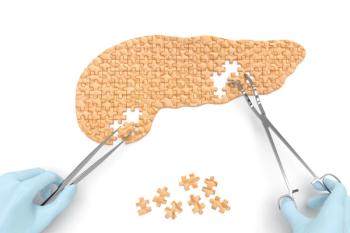
Cabozantinib With Nivolumab Extended PFS in Patients With Advanced Recurring Endometrial Cancer
The study, presented at the virtual ASCO20, showed significant clinical benefit for patients with endometrial cancer who were treated with cabozantinib and nivolumab.
A study presented in the 2020 American Society of Clinical Oncology (ASCO) Virtual Scientific Program reported improved rates of progression free survival (PFS) in patients with advanced recurring endometrial cancer (EC) through treatment with cabozantinib and nivolumab.
Effective treatment for advanced recurrent endometrial cancer (EC) is limited. Vascular endothelial growth factor and inflammatory chemokines are proangiogenic factors and immune modulators involved in immune suppression, and reprogramming the tumor microenvironment by combing antiangiogenic and immunotherapy (IO) may enhance antitumor responses, according to the study’s investigators.
Investigators asserted the potential of cabozantinib in inhibiting tumor cell growth by blocking necessary enzymes; immunotherapy with monoclonal antibodies, such as nivolumab, also may be effective in aiding antitumor responses by interfering with the ability of tumor cells to grow and spread; the combination of cabozantinib and nivolumab may work more effectively in EC therapies.
The study, presented by Stephanie Lheureux, MD, PhD, designed 3 arms: arm A patients received cabozantinib and nivolumab, arm B received nivolumab, and arm C was an exploratory cohort and included post progression patients on immune therapy or patients with recurrent carcinosarcoma, who received both cabozantinib and nivolumab. The study incorporated 76 evaluable patients: 36 in arm A, 18 in arm B, and 9 in arm C, including 7 patients who crossed over from arm B to arm C. All patients had previously received at least 1 line of platinum-based chemotherapy, and had an ECOG performance status (PS) between 0 and 2.
The randomized, open-label, phase 2 trial compared the arms and evaluated data using Kaplan-Meier analysis, which estimated median PFS survival to be significant: 5.3 months in arm A and 1.9 months in arm B. In terms of the objective response rates (ORR), investigators found an ORR of 44.4% in arm A and 16.7% in arm B, also significant.
Lheureux noted the favorable findings related to clinical benefit as well, as arm A showed 69.4% clinical benefit, whereas arm B showed 22.2%.
The study began in January 2018, with plans for completion in January 2021.
The most frequent adverse events (AEs) for arm A were diarrhea, increases in aminotransferase (AST) and alanine aminotransferase (ALT), and nausea, whereas AEs for arm B included fatigue and rash.
“Cabozantinib plus nivolumab demonstrates improved PFS compared to nivolumab in heavily pre-treated women with recurrent EC,” the authors concluded, also stating that further investigation is necessary.
References:
1. Lheureux S, Matei D, Konstantinopoulos PA, et al. A randomized phase II study of cabozantinib and nivolumab versus nivolumab in recurrent endometrial cancer. ASCO. J Clin Oncol 38: 2020 (suppl; abstr 6010). doi: 10.1200/JCO.2020.38.15_suppl.6010.
Newsletter
Pharmacy practice is always changing. Stay ahead of the curve with the Drug Topics newsletter and get the latest drug information, industry trends, and patient care tips.























